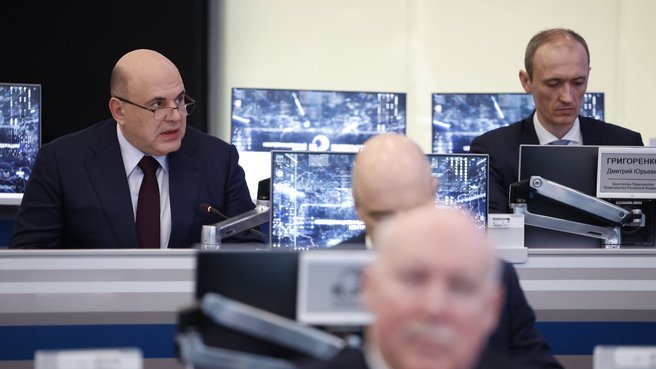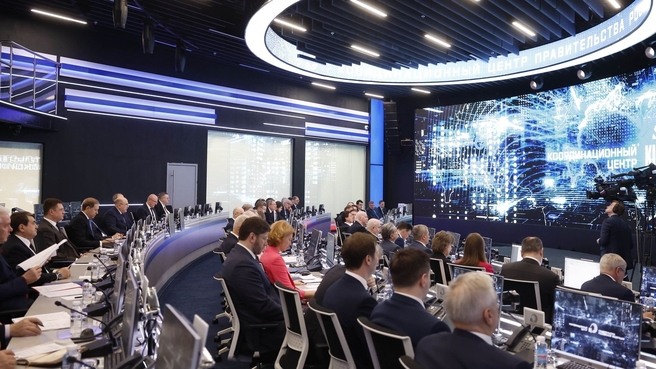Mikhail Mishustin: “Russia has traditionally strong positions in Eurasia. It is important that integration associations show convincing results. In particular, following last year’s performance, the EAEU’s gross domestic product increased by about 3.8 percent, which is more than the world average.”
Mikhail Mishustin’s opening remarks:
Good afternoon, colleagues.
Today we will discuss the priority tasks of the development of Eurasian integration.
The President stressed that it was important to more actively launch mechanisms to create large spaces based on cooperation between neighbouring countries, whose economies, social systems, resource potential, and infrastructure complement each other. In fact, these large spaces are the foundation of the multipolar world order.
Today, the conditions to participate in trade are becoming more and more tough. Pressure is increasing on countries of the Global South that do not agree with the collective West’s attempts to maintain claims to dominance in the world economy.
We believe uniting in interstate organisations and creating independent and relatively autonomous macro-regions is an effective response to these risks. It is regional integration that is replacing globalisation. This is a fairly natural geopolitical process that has already been launched.
The Greater Eurasia space is becoming one of the centres of the new multipolar world. The interests of all the world’s largest players are concentrated here, new points of economic growth naturally appear, and significant reserves of energy resources, raw materials, rare earth metals, and fresh water are concentrated here. Key transport and logistics routes that connect Europe and the Asia-Pacific Region go through this territory, which is also very important.
Russia has traditionally strong positions in Eurasia. They is based on fundamental historical, sociocultural, geographical and other factors.
Our country is working actively in the Eurasian Economic Union and the Union State of Russia and Belarus. We are working to make the Commonwealth of Independent States function more effectively.
It is important that integration associations are posting convincing results. For example, the EAEU GDP grew by an estimated 3.8 percent in late 2023 and exceeded the average global indicator. This is also much better than the combined EU GDP that grew by about 0.5 percent.
Indicatively, the five states’ GDP is growing faster than in CIS countries that are not involved in the more profound integration format. This proves the values of interaction between EAEU members once again.
Mutual trade also continues to expand. In 2023, the Eurasian Economic Union posted trade volumes worth a record-breaking 7.4 trillion roubles. This exceeded initial trade statistics (during its inception) by almost 100 percent.
The Commonwealth of Independent States posted impressive trade volumes exceeding 10 trillion roubles.
Regarding our Union State, Russia-Belarus trade has now reached about 4 trillion roubles. I have recently discussed this issue with the Prime Minister of Belarus.
We need to expand cooperation with friendly countries in all spheres. It is necessary to chart an action strategy that would make it possible to use available resources in the most effective way. We need to single out leading high-priority aspects in every sphere, including the industry, agriculture, digitalisation and migration. We must define initiatives that can unlock the integration development potential in the most effective way. Of course, we must do everything possible for implementing them.
Another key task is to develop advanced infrastructure to strengthen the Russian economy’s connectivity with the countries of the Commonwealth of Independent States and the Global South. This involves international transport corridors to speed up the delivery of goods and cargo, simplify logistics and make passenger transport more convenient, as well as introduction of settlement systems that would enable businesses to fulfil contracts at minimum cost.
We will also definitely enhance cooperation on the humanitarian track. This is the main condition for the rapprochement of our peoples and mutual understanding between them. We need to keep expanding joint projects in healthcare, science, culture, sports and, of course, education.
Colleagues,
We have already started to develop key integration and national strategic documents. First of all, I am referring to the plan for implementing the Declaration on the Further Development of Economic Processes within the Eurasian Economic Union, which was approved by our President and other leaders of the five-nation association last December in St Petersburg. Work is underway on the decisions that are necessary for implementing Russia’s Strategy for Foreign Economic Activity until 2030. The Concept of the Greater Eurasian Partnership, proposed by the President of Russia, is also being prepared. These documents should clearly reflect our view of the priorities of cooperation with our closest neighbours and allies.
Today, during this strategic session, it is important to define specific tasks and initiatives. They will become the basis for a further programme of integration cooperation. And we will continue Russia’s active involvement in shaping a multipolar international trade and economic architecture.














